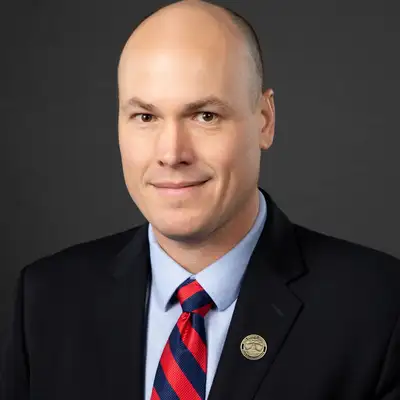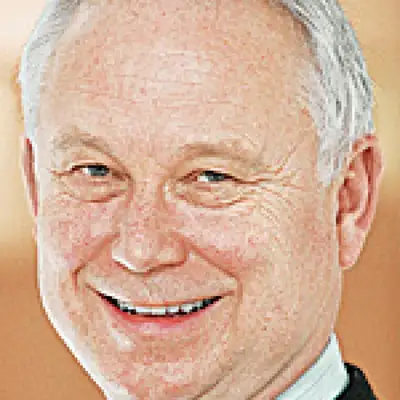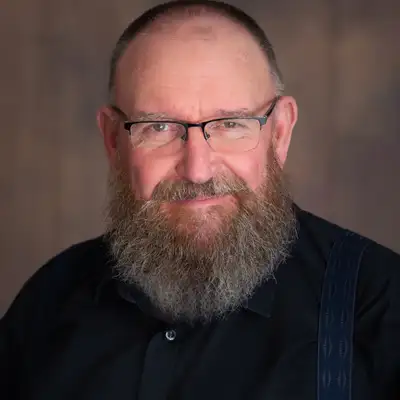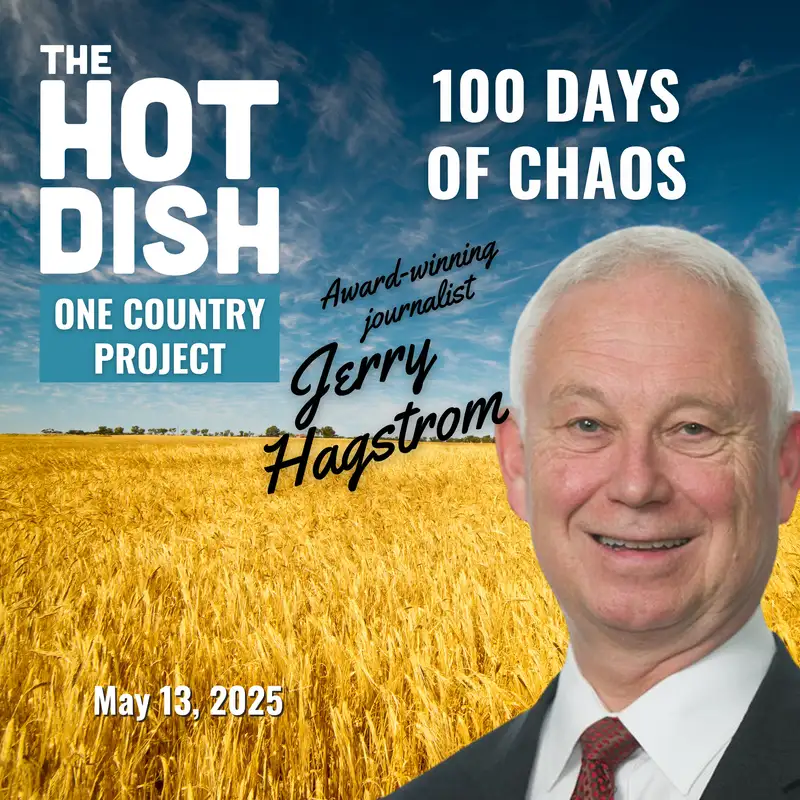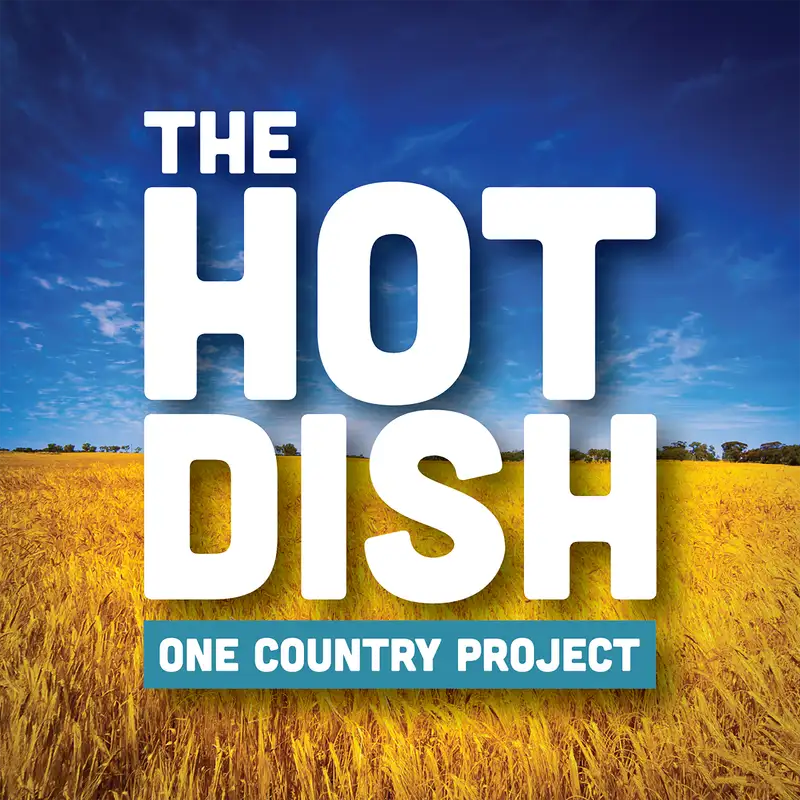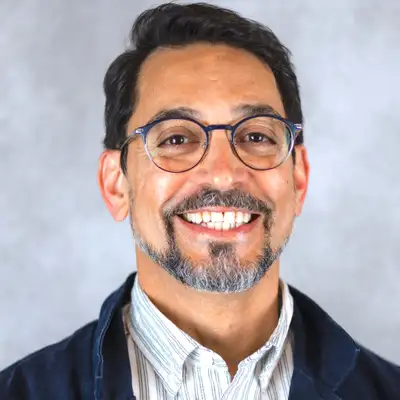100 Days of Chaos
Joel Heitkamp [00:00:04]:
Welcome to the Hot Dish, comfort food for rural America. I'm Joel Heitkamp. Heidi left the handsome half to introduce the show today. We received some listener mail this week that we want to highlight. First and foremost, Brian from South Dakota reached out about farming and his worries about the silent crisis of small farms quitting due to hardship. You know what, Brian? We hear you. We really do. To address these concerns, I talked with prize winning agricultural journalist Jerry Hagstrom about how Trump's first 100 days in office have impacted agriculture and farming. We'll get to him in a bit. On the other side, Amy praised our recent episode with Jess Piper for highlighting how much of rural America doesn't farm and isn't directly related to agriculture. We hear you too, Amy. So we brought in JD Scholten to speak with Sarah Melotte and Bob Leonard about all the other ways the administration is hurting rural communities, from tariffs to healthcare, education, manufacturing, and so much more. So listen up, we've got a lot of good information for you today. JD, get us started.
JD Scholten [00:01:24]:
I'm JD scholten, a One Country Project board member. Today I'm speaking with two journalists, Sarah Melotte and Bob Leonard. Sarah is a data correspondent for the Daily Yonder and a rural geographer based in North Carolina. Bob is a retired news director for KNIA/KRLS Radio and has written for the New York Times, USA Today, and many, many more publications, but is currently authoring a substack called Deep Midwest: Politics and Culture. Welcome to the Hot Dish, Sarah and Bob.
Bob Leonard [00:01:52]:
Thanks for having us.
JD Scholten [00:01:54]:
So, I know Bob. Sarah, this is first time but I've seen your work and your videos so I'm eager to talk to you both. But my first question will be for Sarah. We just got through the first hundred days of the Trump presidency in his second administration. What are you seeing in your neck of the woods and let folks know like where you're - you're kind of at as well.
Sarah Melotte [00:02:13]:
Sure. Thanks for having me on, J.D. I live in western North Carolina in a town called Bakersville. It's about an hour north of Asheville, if you're familiar with the area. We got hit by Hurricane Helene last fall. And so one thing that is a frequent topic of conversation in my neck of the woods is hurricane recovery because we are, what is it, six months now out from the storm and we still have a lot of work to do. And so one thing that we're kind of anxious about with the Trump administration is talks of gutting FEMA. Kristi Noem talked about getting rid of FEMA. There's been talks of eliminating programs that help communities prepare for disasters in the future. And so it's a, it's kind of a scary time thinking about where our communities like mine, going to come up with funds to not only recover from this disaster, but prepare for future ones. And so that is kind of taking up a lot of the, you know, discourse around here, for sure.
JD Scholten [00:03:12]:
Yeah, we, we have that here in Sioux City. We had flooding 10 months ago and we're still dealing with FEMA. And up north in northwest Iowa, hit was hit worse than what we were here. And across river in South Dakota in Kristi Nome Land, nevertheless. So, Bob, you want to let folks know where you're at and what people are talking about?
Bob Leonard [00:03:32]:
Well, sure. I'm located in Marion County, southeast of Des Moines, and it's a rural area. We've got some manufacturing. And President Trump was talking about we're going to feel the pain. And we're feeling the pain, lots of pain. Talked to an AmeriCorps volunteer yesterday who lost her job. Talked to a hospital CEO yesterday that says if the House Medicaid cuts go through, it's going to devastate rural hospitals. They're going to close. 40% of Iowa births are Medicaid sponsored. Just think how that's, if that's cut, it's going to also impact, you know, the 60% that isn't. Talked to a manufacturer yesterday. She told me that the tariffs have already driven their prices up, broke their supply chain. It goes on and on and on. A woman that served the elderly, her job is gone. The pain is here. And as you know, JD And Sarah, in small towns, this reverberates. You know, people, you see them everywhere and we're talking and it's not good.
JD Scholten [00:04:37]:
Thanks, Bob. I want to talk about the tariffs. There's a lot of uncertainty. There's a lot of chaos in a lot of different issues. But that's one thing that I feel is kind of top of mind for a lot of folks. You mentioned supply chain. Can you talk about the impact even if they aren't implemented right away or anything like that? What's happening when it comes to tariffs in your area?
Bob Leonard [00:04:59]:
Well, there's great concern that President Trump can't be trusted. He's been up and down on the tariffs. He's all over the place. These manufacturers that I know, I'll focus on manufacturing. They plan ahead for years. They have international relationships, people that trust them to deliver. And it's just that trust is gone. And we understand why and so people are, are concerned. And these are good jobs too. I mean when I pull into the parking lots of some of these places, the oldest, worst beat up truck in the lot is mine. So these are good, good paying jobs and a lot of them are going to, they're going to be impacted. I can't say how much it's impacting even down to our local, you know, small mom and pop places. I talked to a woman who runs a printing shop where they silk screen shirts. I said what's going to happen with your prices? Where's your supply chain? She says, well, we don't hardly make, you know, textiles anymore. And she doesn't think the textile manufacturing is going to come back. She says that they've already penciled in what their prices are going to be, but they're just, they're hopeful that the tariffs go away. But so you know what couldn't get out of her, whether it's 30% or a 50%. But if the tariff is 100%, those goods, those sweatshirts we like to wear, I guess "hoodies" the kids call them, that we like to wear with our school on them. They're going to double in price potentially. That's, that's my conjecture.
JD Scholten [00:06:27]:
Yeah. And how about you Sarah?
Sarah Melotte [00:06:29]:
I think it's still to be seen what kind of effect the tariffs are going to have here in western North Carolina. For me specifically, we, we don't have a huge manufacturing base here. And the small plants that are here I'm not connected with. So I think we're going to see some long term effects here. But you know, Bob already touched on Medicaid and all of these other things are all connected to rural economies and so forth. And that's another thing that you know, if I had to say FEMA is number one or disaster relief and rural health care systems I think is my number two area of concern. North Carolina was one of the most recent states to pass Medicaid expansion under the Affordable Care Act. And it's really important that that Medicaid expansion population keeps their federal match. I recently spoke to someone, a source from a policy research organization about a Medicaid story, was telling me about how Medicaid expansion, states that have passed it have fewer hospitals that are operating in the red, that are financially vulnerable to closures or partial closures. And that's because Medicaid expansion decreases the share of patients who are uncompensated or who just don't have any kind of insurance whatsoever. And so the more people that can be covered under some form of insurance, the better for the hospital. And that's particularly true of rural hospitals that are already more strapped for cash than other urban and suburban hospitals. And so, you know, the White House budget proposal came out recently, a few days ago. And I'm just a little bit worried about, you know, what we're going to see up here. And we have a hospital here that closed the Maternal Care ward in 2017. And we just can't afford to have any more cuts to our hospital here because I already have friends that have had to drive all the way down the mountain to give birth, down winding mountain roads in the middle of winter. And you know, it's like, it's just not an ideal situation. And so, you know, that's another thing that I'm keeping an eye on as well.
JD Scholten [00:08:35]:
One of the things, a couple weeks ago I went to our Head Start. In Sioux City alone, we have 29 different head starts and that's where a lot of like low-income people can have kids' daycare like before kindergarten and all that stuff. And it's, it's one of the best return on investments we have, investing in child care. And the very next day in Trump's budget, it was to get rid of a Head Start across the or, or have at least steep cuts. If not, you get rid of it completely. And it's just frightening to see these communities that, that allows a parent to go work and, and to get back into the workforce. And we talk about workforce shortages and all that stuff. And it's just very frustrating to see what's happening out of the White House. And so as that happens, in Iowa's self, I saw what was, there's a frustration that was starting to boil over and I ended up doing holding three rallies in early March across the state. And more and more protests are happening. Sarah, are you seeing more protests in North Carolina? Are there people, what's the reaction to people on the ground out there?
Sarah Melotte [00:09:43]:
I have been seeing more protests. We have an ongoing story about the, our regional library system here in the Tri-county area that I live in that I won't get into because it, it's very detailed. But essentially a local library is, is, is very vulnerable to be shut down because they want to withdraw from the regional library system. So over the past two years that that has been going on, there have been lots of protest against that motion. And so there's protesting about that. I just went to one yesterday actually at a County Commissioners meeting in neighboring Yancey County. And then we've seen the hands off protests as well. Spruce Pine had one. And we recently published a story with a, a map that I created showing where all of these protests were. I think there was like over 400 protests all across rural America, you know, fighting oligarchy and all of these budget cuts and such. So I think the response has been resounding disapproval from a lot of rural Americans. And I don't think that - I think that's bipartisan. I think that that's kind of... I think people across the board are kind of worried. I don't have, you know, data on that, on who's most worried or not, but it seems like a widespread anxiety for sure.
JD Scholten [00:11:04]:
That's really interesting, Sarah. We've had a lot of protests here in Iowa, across the entire state, and there is a, just an enthusiasm that's out there and I'm hoping, hoping we can harness that into change. So what about you, Bob? Are you seeing a lot of protests in your area?
Bob Leonard [00:11:20]:
Well, I'm seeing a lot of protests. There's a lot of energy and, and here I want to highlight Sarah's work on her map and, you know, subsequent research on where the rural protests are in the Daily Yonder. That was a fantastic, important piece. And it's important that it's rural places. I mean, it's important for urban places to show up. But, but the fact that rural people are showing up is fantastic. It's very, very interesting to me. I don't know how many protests I've been to, maybe six or seven. Most of them in Des Moines because Des Moines is close enough for us to go. But on Thursday, I'm going to go and up to Panora in Guthrie County, where our friend Liz Garst is part of a protest. Guthrie County doesn't have a stoplight. There's a protest every Thursday with about 30 people attend. And I'm going to go up and visit and check it out. But if you've got 30 people in Panora showing up, that's better than 300 people in Des Moines or even 3,000 people in Des Moines or, you know, maybe 10,000 people in New York. It's fantastic because the rural people are standing up. They are outraged. And one of the things that people are really looking for is something to do. They need leadership, they want charisma, and they're just ready to go. It's very interesting.
JD Scholten [00:12:48]:
With all the turmoil happening coming out of the administration leading to these grassroots protests, the things that both you and Sarah have attended, what are you guys seeing as coming next for the people of this country?
Bob Leonard [00:12:59]:
What is coming is more outrage. And one of the things, one of the things I want to fight back against is a lot of the Democratic Party is portraying rural people as victims. We aren't victims. We're fighters. We're going to fight these issues. We're going to fight the oligarchy. People are becoming more and more aware of the lies they've been told by MAGA media. And they're learning. They're opening their eyes in part because they're seeing the pain. The pain is hitting their families, it's hitting their friends, it's hitting their communities. Road construction projects are on hold. Cops' grants are on hold. There's so much happening, and it is hitting us physically, visibly, and there's going to be more and more outrage. And the key is we're looking for leaders. We're looking for leaders like I've never seen us look for leaders before, since the late 1960s and early 1970s. And so this is, this is something really important. And one of the things to me is think about the people with charisma in the Democratic Party. It's AOC, it's Jasmine Crockett. It's, you know, it's some other, it's some other people that are stepping forward. Cory Booker. Those are the people that are going to lead. And JD is a leader in Iowa and very grateful for his leadership. And at the, at the places that I've seen, it's charismatic individuals that are coming forward. And the Right has this concept that I just stumbled across, but it's bigger than I've ever thought. They say there's a hunger for charisma, an insatiable hunger for charisma. And they've got that with Donald Trump. They've got, even though I don't understand why, he's clearly got it for them, and they've got it in other kinds of leadership. And what does the Left do to our charismatic individuals, especially if they're on the Left? What do the Democrats do? Well, they try to tamper them down. They try to stop them. They try to bring them back to what they think is normalcy. No, we let the charismatic people lead us. And I think that's what's got to emerge. I think that Democrats right now and Independents and Republicans that see what is going wrong with our country, they want charismatic leadership. And we've got, and the Democratic Party has to let those people deliver.
JD Scholten [00:15:28]:
Thanks, Bob. Sarah, what are you seeing?
Sarah Melotte [00:15:30]:
When it comes to the next 100 days, I think one thing that I am keeping an eye on is the impact of immigration or declining immigration in rural America. The new census numbers for 2024 came out recently, and I did a report on that - and this is partly good news - that rural America is growing. It's been growing for the past four years. That came after a decade of population decline. And so things are looking up to keep that momentum up and to keep rural America invigorated. I think that we do not need to discourage immigration to rural America. And that's exactly, I think what the Trump administration is doing. And some of the impact of these immigration policies are going to be that people that are, even people who are documented and are here on work visas, are thinking about being here on work or student visas, are going to rethink that decision because of how intimidating it has been for a lot of new Americans to be here. And, you know, I was looking at some numbers recently. I actually have a interview tomorrow with a demographer to talk about this for a story that I'm going to put out soon here at the Daily Yonder about the impact of international immigration in rural America. And, you know, some of those numbers suggest that, you know, more than half of population gain in the last four years was from international immigration. And those are preliminary numbers. So I don't have direct figures yet. But the bottom line is that this is a huge area of growth for rural, especially because in recent years, deaths have been outnumbering births, which is something demographers call "natural decrease." And so, you know, without new people moving in, you're going to see just decrease in general on that, you know, is a bad omen for, you know, economic decline and upheaval and stuff like that. And so it's we want to keep seeing rural America grow. And I think discouraging immigration is not the way to do that. And so that's one thing I'm keeping my eye on. You know, we have a lot of new Americans or people from elsewhere on work visas that do a lot of important work here, and they are really productive members of society that deserve to be here and that do a lot of really important work in rural counties all over the US and so I'm keeping my eye on that. In the next 100 days, what's that going to look like? I don't really know yet.
JD Scholten [00:17:51]:
Wonderful. Two things as we wrap up. I'll start with Sarah. What gives you hope? And also, where can folks follow your work?
Sarah Melotte [00:17:59]:
I think what gives me hope is what I just talked about. Every year I see new numbers that show that rural America is growing. And I think even though we've had a lot of disappointing outcomes here in western North Carolina in terms of library issues and things like that, I think that the community solidarity that I've seen around those issues has been hopeful and that we've done a lot of important work after the hurricane. Those things give me hope. You can follow our work at the Daily Yonder, at the dailyyonder.com. I also have a data newsletter called the Rural Index that you can subscribe to. It's every other week. It's a map or a graphic, something interesting, hopefully. Last week it was Bigfoot, the week before that it was about DOGE. So I go back and forth between serious and non serious topics. But yeah, we're, we'd love for you to subscribe and read more of the Daily Yonder.
JD Scholten [00:18:52]:
I like it. All right, Bob, how about you? What, what gives you hope and where can people find your work?
Bob Leonard [00:18:57]:
What gives me hope is when I'm at these rallies and talking to my neighbors and friends is that they are recognizing what's going on. They are recognizing it's not 2015 anymore. They're recognizing that America is under threat from within and they're coming together. And it's not just Democrats, it's Independents and it's Republicans. And that gives me a lot of hope. And Sarah's documentation of the protests across the United States in rural America gave me great hope when I came across it. And so thank you for that, Sarah. And I am hopeful. I am really focused and a lot of our friends are focused. We need to recognize that voting isn't enough and people are starting to see that. They're reaching out, they're willing to donate, they're willing to find something that they can do so that when they're kids and grandkids, ask them what did they do when the Authoritarians came for America, they can say, "I did X, Y and Z and I fought." And I think that that is, it's incredible. I'm very hopeful. People can find more of my work at Deep Midwest: Politics and Culture. And thanks for having us.
JD Scholten [00:20:24]:
Bob, Sarah, thank you so much. Huge fan of both your works and just appreciate your time.
Joel Heitkamp [00:20:34]:
You gotta love an old baseball player. Thanks to JD for the great conversation with Sarah and Bob. You know, this is a real treat for me. I get a chance to visit with Jerry Hagstrom. To say that he is an award winning Ag journalist would be an understatement. He really is prize winning, Ag journalist, book author, commentator and of course, all of you farmers out there know what DTN is. He's a DTN political correspondent and he writes the Hagstrom Report, a daily service for subscribers. Columnist for the National Journal in Washington. He writes for many other publications. In other words, it's a little intimidating, but we have him with. Jerry, good to have you on the Hot Dish.
Jerry Hagstrom [00:21:15]:
Well, thank you. I'm very happy to be here and have admired the work that you do and that your sister Heidi has done for many years. Very interested to hear what you have to ask about.
Joel Heitkamp [00:21:27]:
I gotta tell you, Jerry, it's just. It's good to talk ag with somebody who understands it on a national scale. I mean, it really is. Describe for those people listening what DTN is so they get a better understanding.
Jerry Hagstrom [00:21:40]:
DTN is a news service that comes out of Omaha, Nebraska. I say that when people are getting me on DTN, they're downloading me from the sky because it's a service that goes to country elevators and to farmers. We do know that on DTN that people care most of all about the weather and then they care about the markets. And third, they care about policy. So that's what the farmers are really interested in. It kind of puts you in your place when you know that policy and what's going on in Washington is third after weather and the markets.
Joel Heitkamp [00:22:18]:
Well, I can tell you this, Jerry. It's like my radio show. It's a lot background, but you get their attention. It's interesting times in ag, it is. Probably the thing they talk about the most to me is the Farm Bill and why Congress can't get a Farm Bill done. Can you explain this to me, Jerry?
Jerry Hagstrom [00:22:36]:
There's just so much division in Washington right now. And oddly enough, the biggest division is not over farm policy. It's over the future of the Supplemental Nutrition Assistance Program called, now called SNAP. But "food stamps" is what most people still know it as. And the Biden Administration used its authority to make a big increase in the food stamp benefits. We all know there's been inflation. We all know that people are supposed to eat healthier and healthier foods are more expensive. And there is just a disagreement about where to move forward on the policy involving SNAP. And now, of course, we're in another period in which Congress is trying to write this what they call Reconciliation Bill. And SNAP is the big part of that. Congress is going to have to decide if they're going to not increase SNAP benefits in the future, which the Democrats don't like. The Republicans would really like to cut them, but they don't dare cut below current levels. And so now they're in a big battle over how to achieve that. And at the same time, continue the tax breaks that were passed in the first Trump administration because they would expire at the end of 2025. And so therefore, the Congress has to act on these. And farmers will want a lot of this, particularly they will want to continue the level of the estate tax. You know, otherwise more farm families would have to pay the estate tax. And so they want to get that done, has to be done by the end of the year. And that's why they're working on this Reconciliation Bill.
Joel Heitkamp [00:24:14]:
Jerry, I'm going to use a name that I know you recognize, which is Collin Peterson from the 7th District in Minnesota. Obviously, we lost Collin to an election, but Chairman of the Ag Committee, you know, the, the ranking member of the Ag Committee at different times. But he understood the Farm Bill. In fact, he wrote the Farm Bill. But, you know, he told me on my radio show often that the key to a good Farm Bill was SNAP, that that marriage between the Farm Bill and SNAP was vitally important. And I think it's important for our listeners to hear to that.
Jerry Hagstrom [00:24:50]:
Well, definitely Collin Peterson understood the Farm Bill and, and actually still does understand the Farm Bill in, in his current work. And Amy Klobuchar told me that Collin Peterson and some people in North Dakota are the only ones who understand the Farm Bill. But this Project 2025 that the Heritage Foundation launched would like to move the SNAP program to the Department of Health and Human Services, which would destroy the coalition that puts it together. And the importance of having the coalition is that members of Congress from urban areas have no reason to vote for a Farm Bill because they don't have any agriculture. But because the SNAP program is in the Farm Bill, they will vote for it. And it's really important to maintain that coalition.
Joel Heitkamp [00:25:40]:
You know, Jerry, oftentimes I struggle on my radio show with people's perception of who are recipients of SNAP. You know, I point out that in the rural area, we utilize it more than the urban area because of elderly and because of the economy and the state of people's income. What are your thoughts on that?
Joel Heitkamp [00:26:01]:
How do we get the rural area to understand who the recipients of SNAP are?
Jerry Hagstrom [00:26:05]:
Well, I wish I could tell you that the people who get SNAP should speak up, but I know that in rural areas, a lot of people are embarrassed to ask for assistance and they're not going to. So I think I just have to ask the middle class people who live in rural areas to have some comprehension of who their neighbors are. To think of the elderly, to think of poor children and the importance of SNAP to them. You have to push yourself a little bit to think about who the poor people are in your community and the importance of SNAP and other nutrition programs to them.
Joel Heitkamp [00:26:40]:
There's also a perception that recipients of SNAP aren't working. True or not?
Jerry Hagstrom [00:26:47]:
For the most part that is not true. Of course the elderly, the disabled are not working, but most of the people who are of working age getting SNAP are working. Now one of the problems we have in our society is that wages are so low and they're still eligible for SNAP. One of the scandals of this has been that there are people who work for Walmart who get SNAP. There have been some people in the military because we don't pay them enough. And so they are working, most of them. Now the Republicans are saying not enough of them are working. They are particularly bothered by what they call "ABODs", and that's the able-bodied people of working age. But in, in some of those cases, those are men who have served in the military and who have mental health problems after they get out. But most of the people who are eligible for SNAP and are working age are working.
Joel Heitkamp [00:27:45]:
So do we get a Farm Bill without SNAP included in it? I mean, we, we've been waiting on a Farm Bill just putting these extensions in and they, you know, we'll take it for another year. And there was a pledge and a promise that we'd get it done, you know, during the interim before Donald Trump became President. That didn't happen. I mean, we're sitting here again now. Is there in 2025 going to be a Farm Bill?
Jerry Hagstrom [00:28:11]:
Well, in 2025 there will at least be probably one thing and maybe there'll be two bills in Reconciliation. It's most likely that the Congress is going to put in a cut for SNAP of some type. Depends on what they end up with. But the House Republicans want to cut $230 billion over 10 years, which would be a huge cut. The Senate Republicans only want to cut $1 billion, which wouldn't be very much. And you could probably achieve it, you know, by having some tougher rules about who's eligible and making sure that people are working. And along with that, they're talking about increasing the reference prices that trigger farm subsidies, also putting in more money for crop insurance. But if they do that, there's all the other programs in the Farm Bill that would not be covered under this. And that's the big problem. Now the House Republican leadership says, well, we'll do that in what they're calling a "Skinny Farm Bill." But whether you can get that through, I don't know. We'll have to see in a couple of weeks what happens if the Republicans actually get their Reconciliation Bill through or not.
Joel Heitkamp [00:29:20]:
You know, the reference prices, you know, the prices where the government would admit that hey, this needs to be the price of a bushel of soybeans to get by. Right? Those haven't been relevant for a while. I mean, my guys can't make it on $10 soybeans. And I think the reference price is somewhere in the $7 range. I mean, is that a make or break it point for ag states?
Jerry Hagstrom [00:29:44]:
Well, I think the need for the aid is a, is a make or break a point for, for ag states. Although you could argue that maybe some of the big farmers could get by with it and then you would just have more smaller farmers going out of business and the land which never goes out of production would be taken over by big farmers. So what happened last year is that they were unable to do a Farm Bill. So then Congress passed an additional $10 billion in Market Assistance for farmers due to low prices. The real issue here is the prices of that grain is sold at have gone up, but the input costs have gone up even more. And so that's why you need to raise the reference prices. In other words, when the price is at a higher level than the current ones, they would still get some, some assistance. And there was also $21 billion in disaster aid that hasn't been distributed yet, but should be coming out soon. But this is not the right way to do it. You should have a stable system under a five-year Farm Bill.
Joel Heitkamp [00:30:44]:
So my guys tell me that the most important thing is crop insurance. That, that's the make or break it for them is some of these things that we just talked about, reference pricing, those type of things, you know, the government seems to step in in emergency situations, you know, when we have a drought, for example, for the folks to understand. But without crop insurance, there's a lot of guys that won't be in farming. And Jerry, that's what they fear the most.
Jerry Hagstrom [00:31:11]:
Well, yes, I don't think there's any real possibility that crop insurance won't be continued. Although this Project 2025 from the Heritage Foundation has proposed cutting the subsidy on crop insurance, I think from the currently 2/3 of the premium to only half the premium. Project 2025 also wants to cut the levels of the other subsidy programs that are put in place through those reference prices. But so far, I don't think Congress is going to go along with that. And we haven't heard anything from the Trump Administration. They've been kind of quite quiet about all of this. They're leaving it up to Congress.
Joel Heitkamp [00:31:52]:
Farmers that I'm talking to because of what's happening with the commodity prices are starting - It isn't wide, I get that, but they are switching around a little bit. They're nervous about soybeans because of these tariffs. They know that a lot of the soybeans go to China, and they know that their big competitor is Brazil and that China is looking to build infrastructure in Brazil, and so some of them are switching to corn a little bit more. How nervous should farmers be about expanded acres in Brazil?
Jerry Hagstrom [00:32:24]:
Oh, I think they should be very nervous about expanded acres in Brazil. But I think the thing that they need to be more worried about is the relationship of the United States and China when it comes to trading products. President Trump seems to like to make China kind of an enemy. And it's hard to trade with a country when you're describing it in the kind of terms that, that he uses. But one thing about President Trump, he does listen to the Markets, particularly the Bond Markets. And so now he has put Scott Bessent, the Treasury Secretary, in charge of negotiating with China. And as we speak, Bessent is going off to Switzerland to conduct the first negotiations with the Chinese. But I think that it's the Trump Administration policies that are the big fear, not the expanded acres in Brazil.
Joel Heitkamp [00:33:19]:
You know, a lot of the guys I talk to as well are my age or older. You know, that's my friend group. And, you know, they've got a long memory. And they know what happened to the wheat market when Carter put an embargo on and we lost the Russian market. And it changed the landscape of what, when I drive around in my pickup, what I see planted out there, I don't see a lot of wheat anymore like I used to see. I think, Jerry, that's one of the things farmers fear the most.
Jerry Hagstrom [00:33:48]:
Oh, I think it is something that. That they fear. I just hope they can have some influence so that it doesn't change again. But one of my frustrations as a reporter has been that since Trump took office, farmers really have not been very outspoken about their. Their fears about the Trump Administration. They, you know, some of them talk a little bit, but they, so many voted for Trump. We say 70% of rural America voted for Trump. Culturally, they feel aligned with him because they believe that even though Trump is from New York and, and is a big businessman, they feel that the cultural elites on the Coasts have not respected them as they have not respected Trump. And so they want to be able to work with Trump. But you've also got to speak up if you're going to have influence. The farm groups don't want to say very much because they're still hoping to work with Trump, even though that has proven to be so difficult.
Joel Heitkamp [00:34:49]:
So that being said, that the Congress is in a position where, and I think this is why farmers haven't spoke up and farm leaders haven't spoke up, is they're so confident because of what you mentioned, the 70% base and that political base for Donald Trump, that no matter what happens, bad times, whatever, he's going to come through, he's going to write a check.
Jerry Hagstrom [00:35:13]:
I think they can count on getting a check if the exports tank. But that's only a short term fix. The real problem is destroying the Overseas Markets. And that's where we go back to the fact that so many farmers saying that we have lost a portion of the soybean market in China since Trump's first term. The other question is, can the Agriculture Department provide the services that people have been hoping for, especially with the conservation programs? And that we don't really know yet. Agriculture Secretary Brooke Rollins says that she is going to announce a reorganization of USDA, trying to push more people out of Washington so they'll be working closer to the people. The difficulty I have with that is that if you, let's say if you move a division of USDA to Nebraska, well, people from all over the country come to Washington to get their problems solved. And so Nebraskans will be treated well. But what about the people from Mississippi? What about the people from Texas? Are they going to be happy with something, with a division of the government that's located other than in Washington? You know, we'll have to see what they planned on this. They moved two divisions of the USDA to Kansas City in the first Trump administration. And they had a problem because so many people quit. And one of the reasons that they quit is that they had working spouses and the spouses couldn't find jobs in Kansas City because Washington is a place where a lot of people who do this kind of work can find jobs. It's this disruptiveness is really an issue.
Joel Heitkamp [00:36:54]:
Okay, let me give you a scenario. I got a friend, Chris, right, wearing a tuxedo in my wedding. We've been friends for a long time. He's got a lady, Diane, that works out at the Farm Service Agency. She's got more years left to work there, if she's allowed to work there, if that office is allowed to stay open. The word is it won't be, that a number of these Counties are going to be together. Now Chris walks in with a file. She knows his land. She knows where the wetlands are. She knows where the marginal land is. He's built a relationship with her over the years. If that goes away, how big of an issue is that for the Chrises of the world?
Jerry Hagstrom [00:37:34]:
I think it's a huge issue. Losing these experienced people is a real problem. But I'm going to tell you what I learned about Agriculture Secretary Brooke Rollins this week, and that is she really responds to personal appeals, either from individual farmers or from members of Congress who have been contacted by individual farmers. So I think very much you have to have a personal appeal. And the farmers need to tell their members of Congress, both the House and the Senate, what their problems are to put more pressure on USDA.
Joel Heitkamp [00:38:12]:
Jerry, I tried. I really did. I tried to prove to you that I'm more experienced when it comes to agriculture than you. I didn't lay one lick on you. You're smarter than I am when it comes to this. I appreciate it. Thank you for coming on the Hot Dish.
Jerry Hagstrom [00:38:26]:
Thank you for the questions and I always enjoyed talking to you and talking to Heidi. And I'm so glad you started this and good luck with it.
Joel Heitkamp [00:38:35]:
You bet. You know, many thanks to our guests today. These conversations proved just how rural communities are impacted by Trump's first hundred days in office. We're all working to protect democracy in this country and we know that means strengthening rural communities, not cutting them off at the knees, right? That's why the Hot Dish is here. We want you to know the facts, to know you're part of a nationwide community of proud rural Americans and to give you hope for a better future. To that end, did we address everything you wanted us to? Is there something you want us to talk about on the Hot Dish? You got to let us know. Email us your thoughts. Our email address is podcast@onecountryproject.org. That's podcast@onecountryproject.org. You can also connect with us and get all of One Country's great content and analysis on Bluesky and Substack. Thank you for joining us today on The Hot Dish, brought to you by the One Country Project, making sure the voices of the rest of us are heard in Washington. We'll be back in two weeks with more Hot Dish, comfort food for rural America.
Creators and Guests


